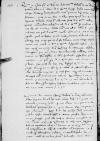⌊⌋, hodie mane abiit nuntius mittoque hunc famulum meum, qui cum litteris ⌊dominorum consiliariorum⌋, quas secum fert, et aliis, quas apud Dominationem Vestram Reverendissimam reperiet, ⌊Vilnam⌋ iturus est. Illi tuto suas Dominatio Vestra Reverendissima credere poterit; inter eundum rediens, ut ad Dominationem Vestram Reverendissimam se conferat, a me illi est iniunctum. ⌊⌋, eas cum Dominatio Vestra Reverendissima similiter subscripserit, suo et meo sigillo, quod inclusum pyxidi mitto, firmari et claudi iubebit; aliusque meus nuntius, quem ob id isti ⌊Vilnam⌋ eunti iunxi, sigillum meum cum pyxide a Dominatione Vestra Reverendissima obsignatum referet. Fuit heri apud me generosus dominus ⌊Ludovicus de Mortangen⌋ castellanus Elbingensis, qui mihi plurima de moliminibus ⌊nobilitatis Culmensis⌋, maxime autem domini ⌊Costka⌋ et domini ⌊Dzyalinski castellani Culmensis paper damaged⌈[nsis]nsis paper damaged⌉⌋ recensuit, quae cum prius Dominatio Vestra Reverendissima sciat, nolo ad praesens esse prolixior. Ego quidem de his satis diffuse ⌊reverendissimo domino Plocensi⌋ scripsi sumque ea in spe, quod ⌊serenissima maiestas regia⌋ frenum effrenis illis hominibus imponet, quod nisi fiat, neque ad ⌊conventus⌋ tuto deinceps nobis convenire erit integrum. Quod reliquum est, me paterno amori et benevolentiae Dominationis Vestrae Reverendissimae ex animo commendo Deumque precor, ut illam quam diutissime sospitem et felicem conservet.

 BCz, 244, p. 104
BCz, 244, p. 104